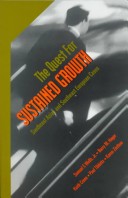This report assesses the "Washington Consensus" on liberalizing markets in pursuit of sustained economic growth. In 1997, the "Asian Economic Miracle," thirty years of rapid growth and low inflation, ended abruptly with runs on Southeast Asian currencies and a massive flight of capital, precipitating deep economic recessions. Meanwhile, the countries of Southeast Europe had been struggling to reconstruct market economies out of the shreds left by socialist economies, their efforts complicated by civil strife or war. Both regions had been urged by international organizations to adopt a package of policies, often called the Washington Consensus, of opening domestic markets, freeing trade, and opening domestic capital markets to free movements of international capital. Did the crisis in Southeast Asia, and related crises in Russia and Latin America, call into question that advice? To address that question and study creation of sustained growth, the September 17-18 1998 conference at the Woodrow Wilson International Center for Scholars examined these two regions.
Panels reviewed the roles of international institutions, central banks, and currency boards; fixing of exchange rates; opportunities and problems of foreign investment; U.S. policy and the international institutions; and financial globalization. Participants included officials from international financial institutions, national banks from the regions, and the United States, as well as economists, historians, and researchers.
- ISBN10 0943875943
- ISBN13 9780943875941
- Publish Date 12 October 1999
- Publish Status Out of Stock
- Out of Print 26 June 2014
- Publish Country US
- Imprint Wilson Centre Press,U.S.
- Format Paperback (US Trade)
- Pages 128
- Language English
